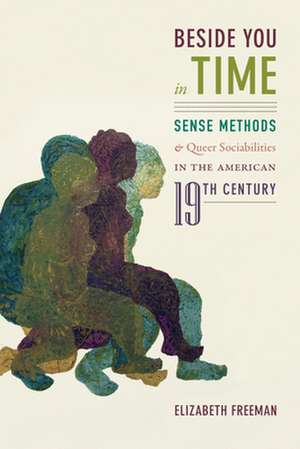Beside You in Time – Sense Methods and Queer Sociabilities in the American Nineteenth Century
Autor Elizabeth Freemanen Limba Engleză Paperback – 5 sep 2019
Preț: 166.29 lei
Nou
Puncte Express: 249
Preț estimativ în valută:
31.82€ • 34.56$ • 26.73£
31.82€ • 34.56$ • 26.73£
Carte disponibilă
Livrare economică 01-15 aprilie
Livrare express 15-21 martie pentru 23.98 lei
Preluare comenzi: 021 569.72.76
Specificații
ISBN-13: 9781478006350
ISBN-10: 1478006358
Pagini: 240
Dimensiuni: 166 x 227 x 17 mm
Greutate: 0.34 kg
Editura: MD – Duke University Press
ISBN-10: 1478006358
Pagini: 240
Dimensiuni: 166 x 227 x 17 mm
Greutate: 0.34 kg
Editura: MD – Duke University Press
Cuprins
Acknowledgments vii
Introduction 1
1. Shake it Off: The Physiopolitics of Shaker Dance, 1774–1856 27
2. The Gift of Constant Escape: Playing Dead in African American Literature, 1849–1900 52
3. Feeling Historicisms: Libidinal History in Twain and Hopkins 87
4. The Sense of Unending: Defective Chronicity in "Bartleby, the Scrivener" and "Melanctha" 124
5. Sacra/Mentality in Djuna Barnes's Nightwood 158
Coda. Rhythm Travel 187
Notes 191
References 199
Index 219
Introduction 1
1. Shake it Off: The Physiopolitics of Shaker Dance, 1774–1856 27
2. The Gift of Constant Escape: Playing Dead in African American Literature, 1849–1900 52
3. Feeling Historicisms: Libidinal History in Twain and Hopkins 87
4. The Sense of Unending: Defective Chronicity in "Bartleby, the Scrivener" and "Melanctha" 124
5. Sacra/Mentality in Djuna Barnes's Nightwood 158
Coda. Rhythm Travel 187
Notes 191
References 199
Index 219
Notă biografică
Descriere
Elizabeth Freeman expands bipolitical and queer theory by outlining a temporal view of the long nineteenth century and showing how time became a social and sensory means by which people resisted disciplinary regimes and assembled into groups in ways that created new forms of sociality.
